Sleep disorders can greatly disrupt your rest, impacting both your physical and mental health. Common types include insomnia, characterized by difficulty falling or staying asleep, and sleep apnea, marked by repeated breathing interruptions. Symptoms often involve fatigue, irritability, and restless nights. Causes range from psychological factors like stress to medical conditions affecting sleep quality. Effective treatments are available, including behavioral therapy and lifestyle changes. Explore the nuances of your sleep health for better management.
Key Takeaways
- Sleep disorders include insomnia, sleep apnea, and other conditions characterized by symptoms like fatigue, irritability, and difficulty sleeping.
- Causes of sleep disorders often involve psychological factors, medical conditions, and lifestyle choices affecting sleep quality.
- Diagnosis typically involves clinical evaluation, patient history, and may include sleep studies to identify underlying issues.
- Treatment options range from behavioral therapies and lifestyle modifications to medications for managing symptoms effectively.
- Maintaining good sleep hygiene, such as a consistent schedule and a comfortable sleep environment, promotes better sleep quality.
Types of Sleep Disorders
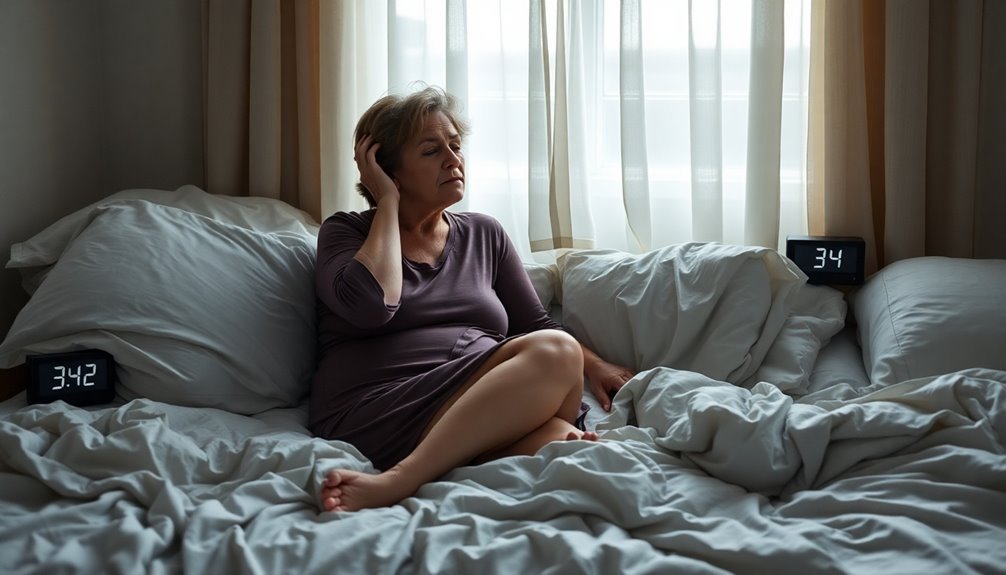
Sleep disorders encompass a range of conditions that disrupt normal sleep patterns and can greatly impact daily functioning. One common issue I've encountered is insomnia, which has several types.
There's acute insomnia, often triggered by stress or life changes, and chronic insomnia, where difficulty sleeping persists over months or years. Understanding these variations can help in finding the right approach to treatment.
Another significant condition is sleep apnea, a serious disorder where breathing repeatedly stops and starts during sleep. This can lead to fragmented sleep and excessive daytime fatigue.
I've learned that tackling these disorders often involves lifestyle changes, medical intervention, or behavioral therapies. Recognizing the types of sleep disorders is the first step toward addressing them effectively.
If you or someone you know is struggling, reaching out for support is essential. Remember, you're not alone in this journey toward better sleep and well-being.
Symptoms of Sleep Disorders
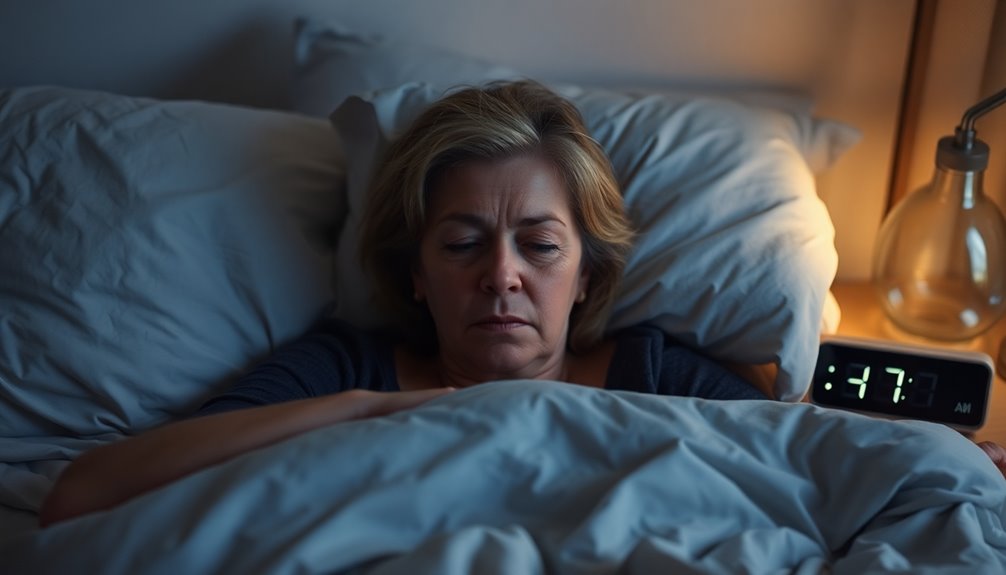
While many people may overlook the signs, recognizing the symptoms of sleep disorders is essential for effective intervention.
I've noticed that common indicators include persistent fatigue, difficulty concentrating, and irritability. For instance, if I frequently wake up gasping for air, it could signal sleep apnea, a condition that disrupts normal breathing during sleep.
Recognizing symptoms like persistent fatigue and irritability is crucial for identifying sleep disorders such as sleep apnea.
On the other hand, if I struggle to fall or stay asleep, I might be experiencing insomnia, which often has various causes, such as stress or anxiety. Other symptoms can include loud snoring, restless legs, or frequent nighttime awakenings.
It's vital to pay attention to these signals, as they can impact not just my sleep quality but overall health and well-being. By identifying these symptoms early, I can seek the support I need and improve my sleep, ultimately fostering a sense of belonging in my daily life.
Causes of Sleep Disorders
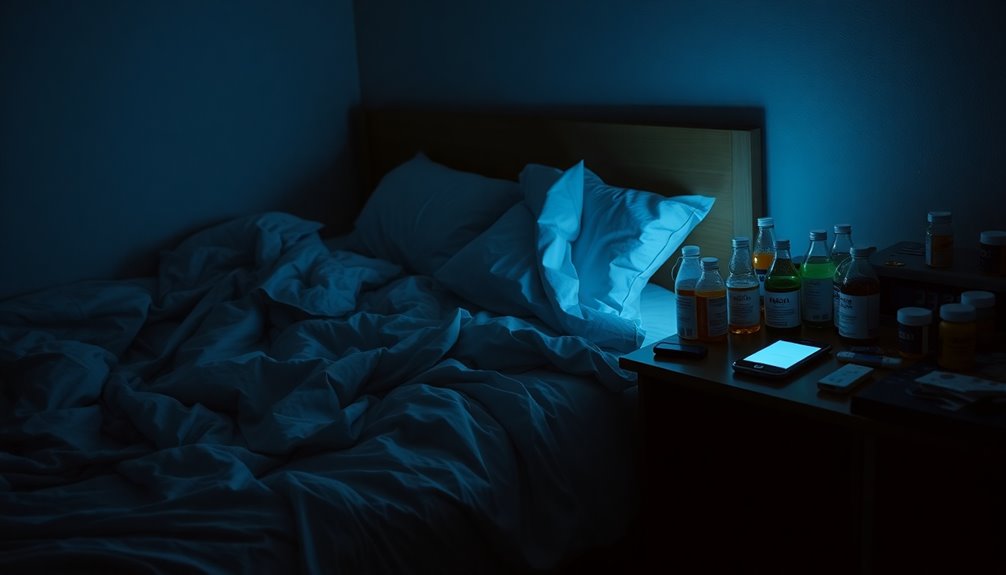
When exploring the causes of sleep disorders, I find that both psychological factors and medical conditions play significant roles.
Stress, anxiety, and depression can disrupt sleep patterns, while various health issues may contribute to difficulty in achieving restorative sleep.
Understanding these underlying causes is essential for effective treatment and management.
Psychological Factors
Psychological factors greatly influence the development of sleep disorders, impacting both the quality and duration of rest.
I've seen how anxiety, stress, and depression can disrupt sleep patterns, making it difficult to achieve restorative sleep.
In my experience, cognitive behavioral therapy (CBT) can be a powerful tool for addressing these psychological issues. It helps in identifying the negative thought patterns that contribute to anxiety and teaches effective anxiety management strategies.
By addressing the root of psychological distress, individuals can often improve their sleep considerably.
If you're struggling, know that you're not alone, and seeking professional help can lead you toward healthier sleep habits.
Understanding these psychological factors is an essential step in reclaiming restful nights.
Medical Conditions
Medical conditions can considerably disrupt sleep, leading to various disorders that affect both the quantity and quality of rest.
For instance, sleep apnea is a serious condition where breathing repeatedly stops and starts during sleep, often resulting in fragmented sleep and daytime fatigue. I've seen how it can leave individuals feeling drained, affecting their daily lives.
Additionally, restless legs syndrome can create an overwhelming urge to move one's legs, making it difficult to fall asleep. This sensation often intensifies during periods of inactivity, causing frustration and further sleep deprivation.
Understanding these medical conditions is essential, as managing them can greatly improve sleep quality and overall well-being. If you relate to these experiences, seeking medical advice could be an important step toward better sleep.
Diagnosis of Sleep Disorders
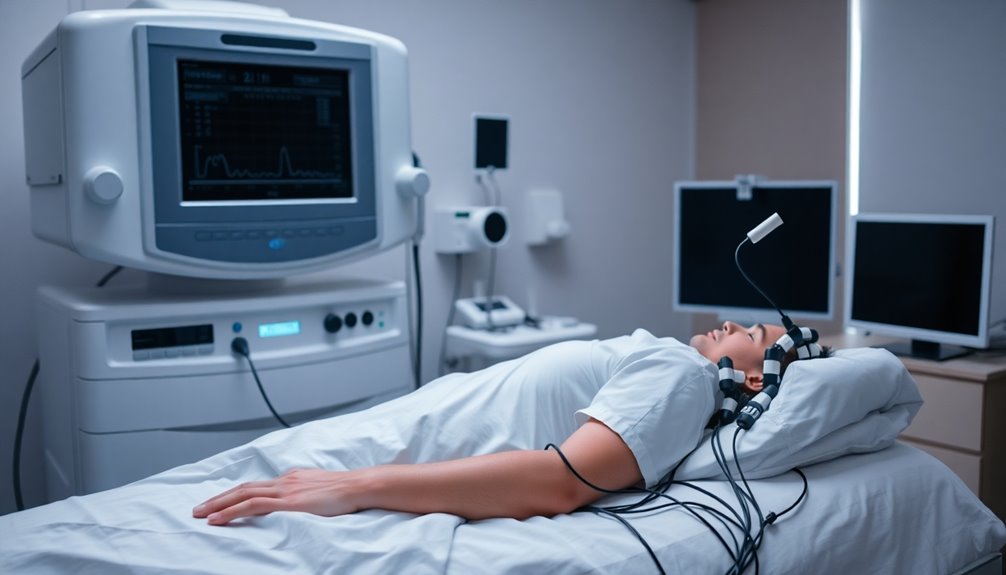
Diagnosing sleep disorders requires a thorough approach that encompasses both clinical evaluation and patient history. I often gather detailed information to understand the patient's sleep patterns, lifestyle, and any underlying medical conditions. This extensive evaluation helps identify potential factors contributing to sleep issues.
Here are three key components involved in the diagnosis:
- Sleep Study: A polysomnography or home sleep apnea test provides vital data on sleep stages, breathing patterns, and brain activity.
- Diagnostic Tests: Additional tests may include actigraphy, which tracks movement during sleep, and blood tests to rule out other conditions.
- Patient History: Discussing symptoms, sleep habits, and any medications can reveal patterns that guide diagnosis.
Together, these elements form a holistic view of one's sleep health, allowing for accurate identification of disorders and paving the way for effective management.
Treatment Options for Sleep Disorders

When addressing sleep disorders, I find it essential to explore various treatment options, including behavioral therapy approaches, medication, and lifestyle modifications.
Each of these strategies can play a vital role in improving sleep quality. Understanding the benefits and limitations of each option helps tailor a thorough treatment plan.
Behavioral Therapy Approaches
Although various treatments exist for sleep disorders, behavioral therapy approaches have gained recognition for their effectiveness in addressing the underlying patterns that disrupt sleep.
I've found that these methods can greatly enhance sleep quality, often without the need for medication. Here are three key techniques:
- Cognitive Behavioral Therapy (CBT): This method helps identify and change negative thoughts about sleep, fostering healthier sleep habits.
- Sleep Restriction: By limiting the time spent in bed, this technique can help consolidate sleep, making it more restorative.
- Stimulus Control: This approach encourages associating the bed with sleep only, helping to break the cycle of insomnia.
Engaging with these techniques can create a supportive environment for improved sleep health, fostering a sense of belonging in the journey toward restful nights.
Medication Options Available
While behavioral therapy approaches have proven effective for many, medication options are also available for those struggling with sleep disorders.
I understand that some might find relief in sleep aids, which can help manage symptoms when other methods fall short. Over-the-counter options like melatonin can be beneficial for occasional sleeplessness, but for chronic issues, prescription options may be necessary.
These medications often fall into categories such as benzodiazepines or non-benzodiazepine sedatives, each with specific benefits and potential side effects.
It's essential to consult a healthcare professional before starting any medication, as they can guide you toward the right treatment plan tailored to your needs.
Lifestyle Modifications Strategies
To improve sleep quality, I often recommend incorporating lifestyle modifications that can greatly impact sleep disorders. Here are three strategies you might find helpful:
- Optimize Your Sleep Environment: Make sure your bedroom is dark, quiet, and cool. Consider blackout curtains, white noise machines, or comfortable bedding to create a restful space.
- Establish a Relaxation Routine: Incorporate relaxation techniques like deep breathing, meditation, or gentle yoga before bedtime. This helps signal your body that it's time to wind down.
- Limit Stimulants: Reduce caffeine and nicotine intake, especially in the afternoon and evening.
Also, avoid heavy meals close to bedtime for better digestion.
Tips for Better Sleep Hygiene
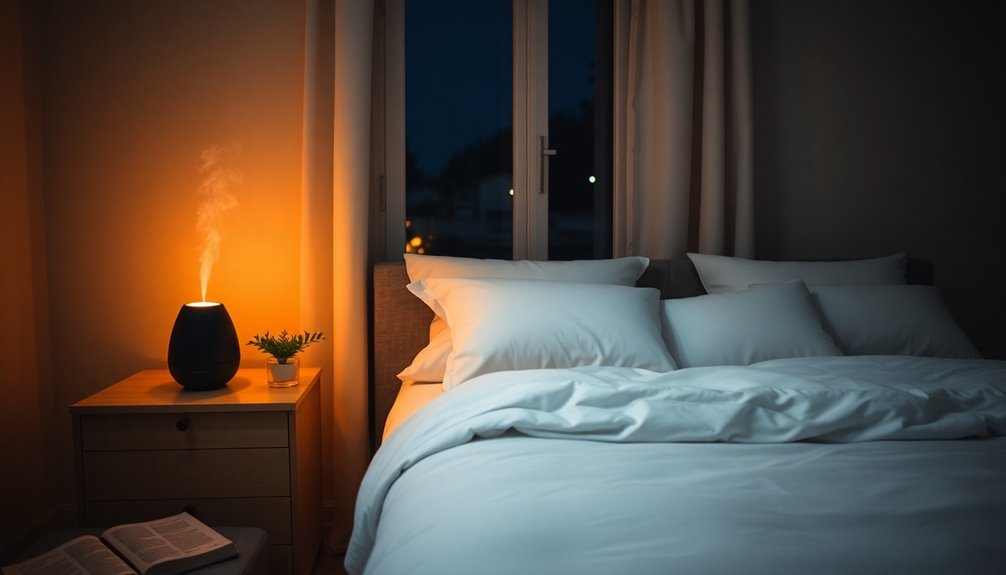
Good sleep hygiene is crucial for maintaining ideal health, as it directly impacts both physical and mental well-being.
To improve your sleep, start by optimizing your sleep environment. Keep your bedroom cool, dark, and quiet, which can greatly enhance your ability to fall and stay asleep. I've found that limiting exposure to screens before bedtime helps signal my body that it's time to wind down.
Optimize your sleep environment by keeping your bedroom cool, dark, and quiet, and limit screen time before bed.
Incorporate relaxation techniques into your nightly routine. Practices such as deep breathing, meditation, or gentle stretching can help calm your mind and prepare you for restful sleep.
It's also essential to maintain a consistent sleep schedule; going to bed and waking up at the same time each day reinforces your body's natural rhythm.
Frequently Asked Questions
Can Sleep Disorders Affect Mental Health?
I believe the correlation between sleep quality and mental health is significant.
Poor sleep can heighten feelings of anxiety, making it harder to cope with daily stressors. When I experience restless nights, I often notice an increase in my anxiety levels.
It's essential to recognize how our sleep patterns can impact our mental well-being. Addressing sleep quality might be key to improving overall mental health and fostering a sense of belonging.
Are Sleep Disorders Hereditary?
Did you know that around 50% of people with sleep disorders report a family history of similar issues? This suggests that genetic factors play a significant role in their development.
I've noticed that if my family members struggle with sleep, I'm more likely to experience similar challenges.
Understanding our family history can help us identify potential risks and seek appropriate interventions, making it essential to contemplate when discussing sleep health.
How Do Sleep Disorders Impact Daily Life?
Sleep disorders can seriously affect daily life.
I've noticed how poor sleep quality leads to decreased focus and energy, making it harder to tackle tasks. My daily productivity suffers, and I often feel irritable or unfocused.
It's frustrating when I can't perform at my best, and those around me mightn't understand the struggle. Understanding the impact of sleep on our lives is essential for fostering a supportive environment.
Is Napping Beneficial for Sleep Disorders?
I've found that napping can be beneficial, especially when using effective napping techniques.
The ideal duration for a nap is typically around 20 to 30 minutes, as this helps recharge without interfering with night sleep.
I've noticed that incorporating short naps into my routine can improve alertness and mood.
However, it's important to listen to your body and find what works best for you, ensuring you feel rested and ready for the day.
What Lifestyle Changes Help Prevent Sleep Disorders?
Changing my lifestyle to improve sleep feels like tuning a fine instrument; every adjustment matters.
I've found that practicing good sleep hygiene, such as maintaining a consistent bedtime and creating a relaxing environment, makes a significant difference.
Incorporating relaxation techniques like deep breathing or meditation helps calm my mind.
These strategies not only enhance my sleep quality but also foster a sense of belonging to a community focused on well-being and health.
Conclusion
To sum up, understanding sleep disorders is like illuminating the dark corners of a restless mind. By recognizing the diverse types, symptoms, and causes, we can navigate our way to effective treatments and improved sleep hygiene. Don't let the shadows of sleepless nights linger; instead, embrace strategies that foster restful slumber. Picture yourself drifting into a peaceful dreamscape, waking rejuvenated and ready to embrace each day. Your journey to better sleep starts now, and it's worth every moment.



